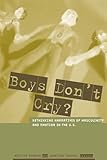Boys Don't Cry? : Rethinking Narratives of Masculinity and Emotion in the U.S. / ed. by Jennifer Travis, Milette Shamir.
Material type: TextPublisher: New York, NY : Columbia University Press, [2002]Copyright date: ©2002Description: 1 online resource (320 p.)Content type:
TextPublisher: New York, NY : Columbia University Press, [2002]Copyright date: ©2002Description: 1 online resource (320 p.)Content type: - 9780231120340
- 9780231506342
- 810.9/352041 810.9352041
- PS173.M36 ǂb B69 2002eb
- online - DeGruyter
- Issued also in print.
| Item type | Current library | Call number | URL | Status | Notes | Barcode | |
|---|---|---|---|---|---|---|---|
 eBook
eBook
|
Biblioteca "Angelicum" Pont. Univ. S.Tommaso d'Aquino Nuvola online | online - DeGruyter (Browse shelf(Opens below)) | Online access | Not for loan (Accesso limitato) | Accesso per gli utenti autorizzati / Access for authorized users | (dgr)9780231506342 |
Frontmatter -- Contents -- List of Contributors -- Acknowledgments -- Introduction -- 1. What Feels an American? -- 2. Loving with a Vengeance: Wieland, Familicide and the Crisis of Masculinity in the Early Nation -- 3. "The Manliest Relations to Men" -- 4. Manly Tears -- 5. How To Be a (Sentimental) Race Man -- 6. The Law of the Heart -- 7. "The Sort of Thing You Should Not Admit" -- 8. Road Work -- 9. Men's Tears and the Roles of Melodrama -- 10. Men's Liberation, Men's Wounds -- 11. The Politics of Feeling -- Bibliography -- Index
restricted access online access with authorization star
http://purl.org/coar/access_right/c_16ec
We take for granted the idea that white, middle-class, straight masculinity connotes total control of emotions, emotional inexpressivity, and emotional isolation. That men repress their feelings as they seek their fortunes in the competitive worlds of business and politics seems to be a given. This collection of essays by prominent literary and cultural critics rethinks such commonly held views by addressing the history and politics of emotion in prevailing narratives about masculinity. How did the story of the emotionally stifled U.S. male come into being? What are its political stakes? Will the "release" of straight, white, middle-class masculine emotion remake existing forms of power or reinforce them? This collection forcefully challenges our most entrenched ideas about male emotion. Through readings of works by Thoreau, Lowell, and W. E. B. Du Bois, and of twentieth century authors such as Hemingway and Kerouac, this book questions the persistence of the emotionally alienated male in narratives of white middle-class masculinity and addresses the political and social implications of male emotional release.
Issued also in print.
Mode of access: Internet via World Wide Web.
In English.
Description based on online resource; title from PDF title page (publisher's Web site, viewed 02. Mrz 2022)


